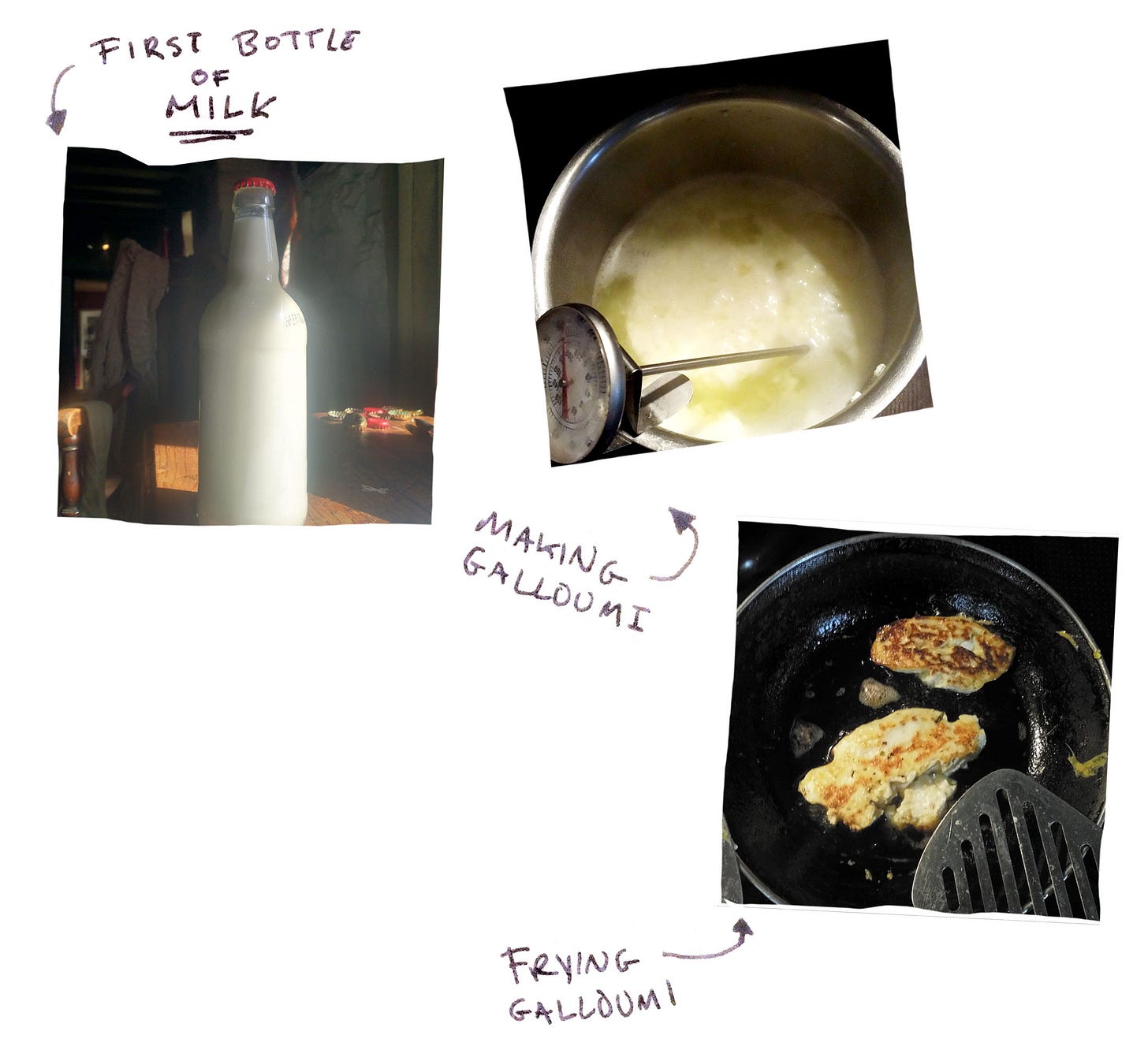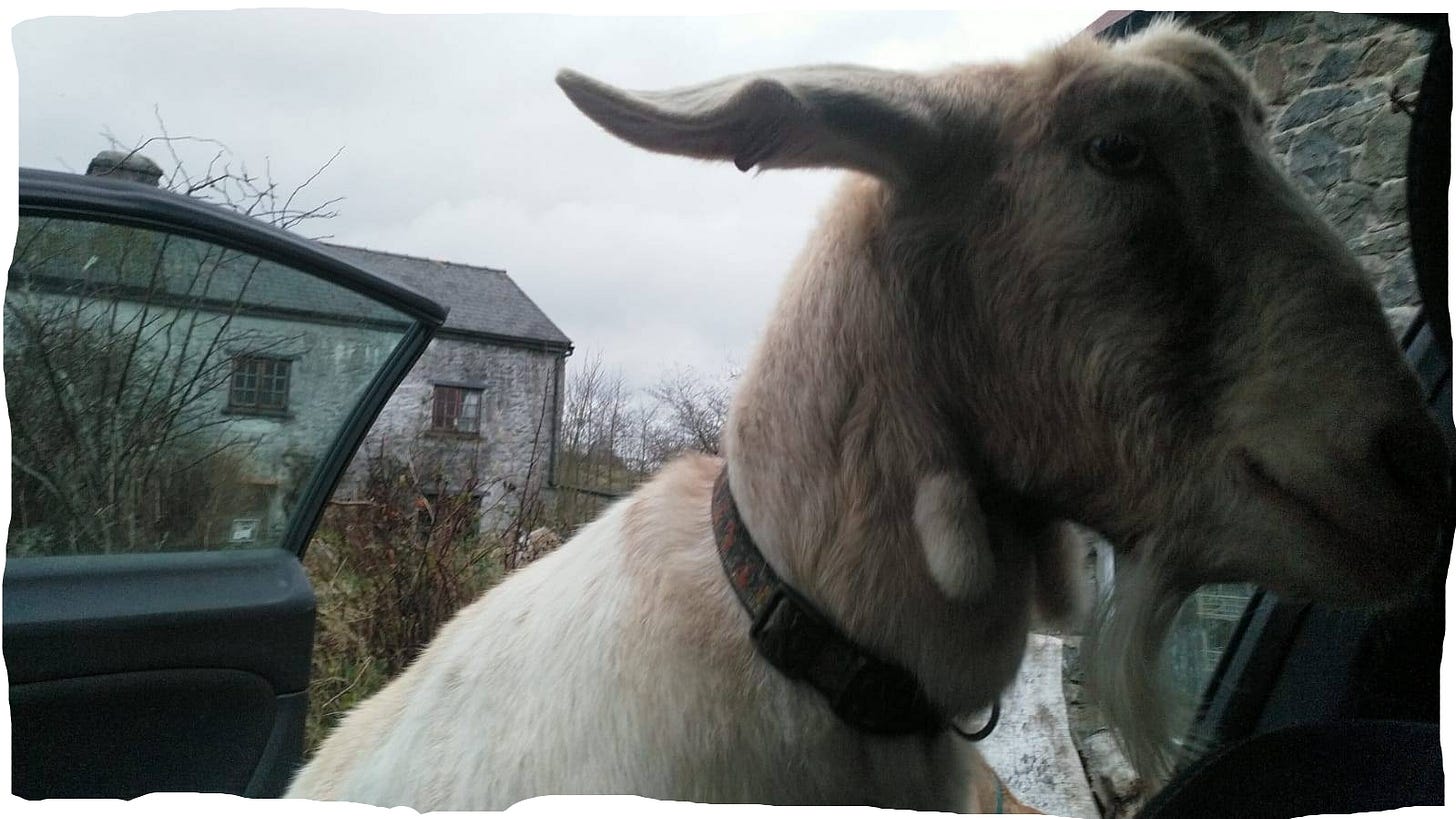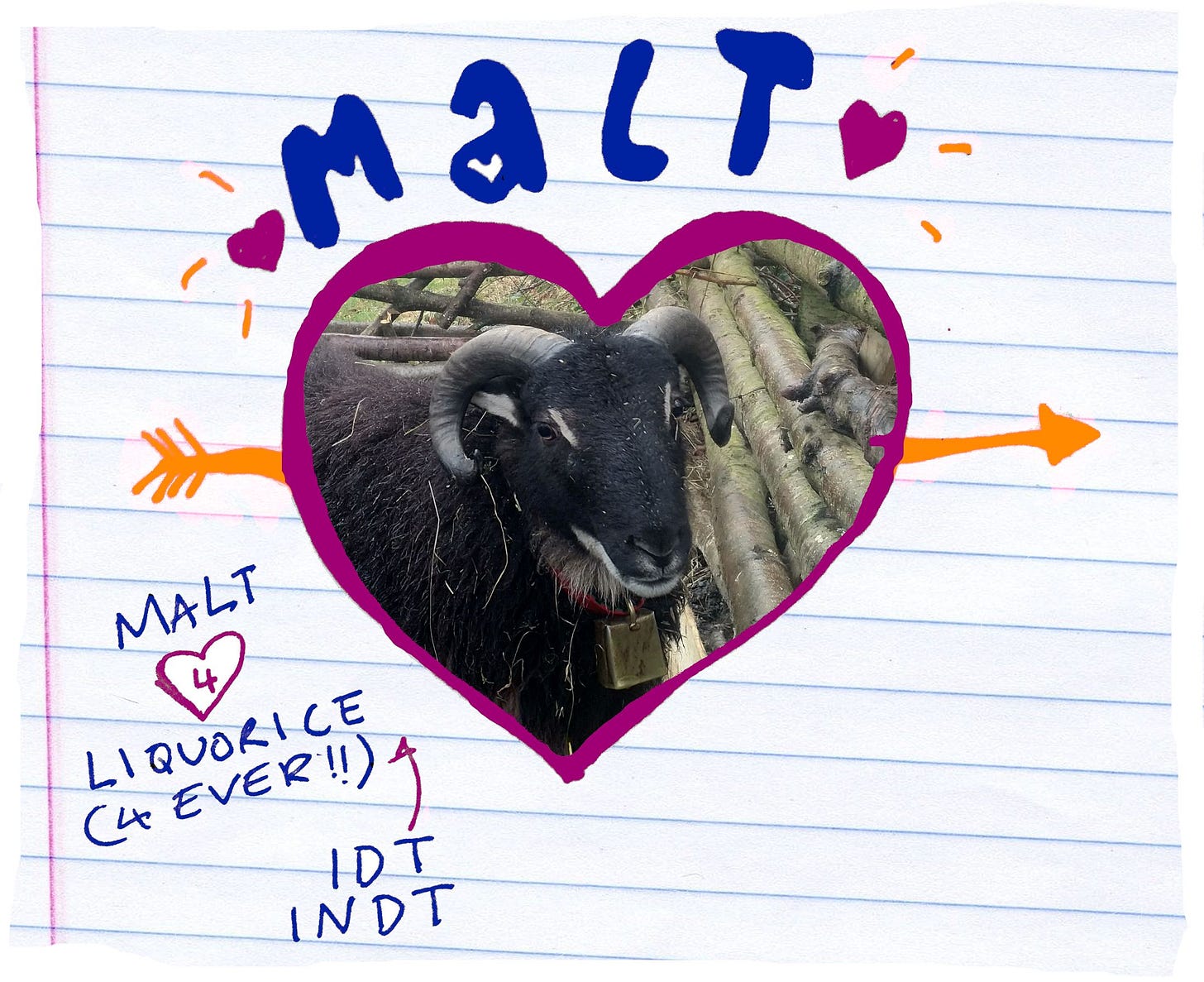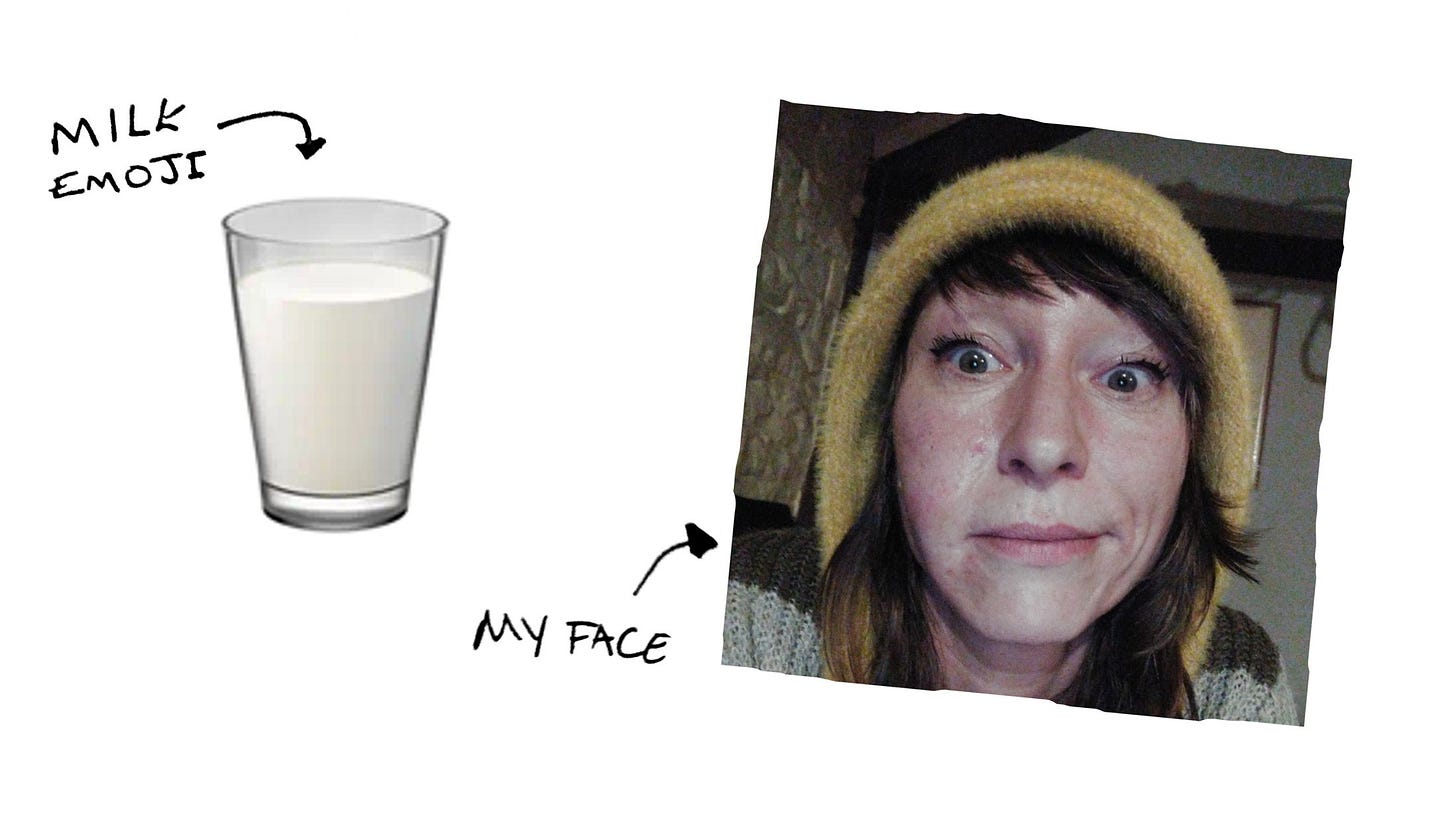Welcome and thank you for accompanying me on the second haphazard outing of Walking With Goats, my offer of forgivably sporadic missives documenting self-sufficiency in the era of Klaus Schwab’s pants party.
Yes indeed, it is the third spring since visions of white-suited biocide-spouting battalions really drove home the practical import of a life-course previously woven from more personal motivations. 2022 will mark my third lap through the smallholders’ hardest season, as well as a giddying swivel from unremitting barrages of global death marketing to… unremitting barrages of global death marketing. It’s a good time to take stock.
Much is said, by thinkers and writers I respect, of the building of parallel structures. Here I feel I can be of use in the canon, for scaling a third year of attempted self-sufficiency – set upon the spongiform foundation of a hippy smallholding childhood – I now have some insight into the reality of trying to replace this most fundamental of societal transactions.
First though, like a small cube of shit cheddar on a cocktail stick displayed atop Morrison’s cheese counter, can I offer you a little time with a goat?
This is Kama.
Kama is Thorne’s sister, determinedly second in command, oversensitive by nature and capable of a wide range of noises of dissatisfaction. Like her sibling, she is pregnant, and as in everything, will not be first, although she bleats pointedly to remind me that she’s not long behind, lying in the hay while I usher Thorne out for the new year’s first milking.
Goats play hardball. In fact it’s beyond contact sport, beyond the savage pragmatism of unfettered market forces. For anyone foolish enough to begin trying to “keep” them, here is my warning: goats know what their milk’s worth, but they’re herbivorous sociopaths. They play to win regardless of the prize.
I’ve come to the conclusion, slowly, over the course of my adult life, that my own key skill is bloody mindedness. In this, we are alike.
Thorne looks at me. I look at Thorne.
We begin another year.
In an era when shepherding metaphors abound, goats have much to teach us. For this reason, I’m going to dedicate a dimension of my dispatches to some of the vital lessons learned from walking alongside them. A few key teachings from the School of Goat Wisdom, that may give us the best possible chances as we’re prodded and persuaded towards the ominous steel doors of the Fourth Industrial Revolution.
Who are they anyway? Why do they turn up all the time offering us buckets of UBI and tasty digital equity?
It is amusing to note that in the helpful PDF compiled in 2017 for public health educators gaming a ‘SPARS’ pandemic, the benign vaccine-championing global health expert who eases the world into its halcyon new era is given the winsome name Paul Farmer. It’s impossible to own livestock at the beginning of the 21st Century and not look over your shoulder, slightly unnerved by the parallels.*
Sheep, for the most part, fear their keepers. Goats have orchestrated a far more equitable status-quo. Thorne will choose any path other than the one I’m leading her down, unless she can overtake and lead herself of course. There must absolutely on no account be any concession to me as Queen, although she does seem to need the foil. I’m not allowed to leave on my own. Memorable moments of punishment for such transgressions include chewing my Honda Civic’s S Type logo off the bonnet, or climbing into the seats at any slim moment of opportunity, on one occasion locating my handbag and immediately eating my phone charger.
I’m necessary to them, but I am not in charge, and every act on their part is intended to instil this.
As this third winter ends, it’s impossible not to speculate at the animals’ underlying cognizance of their social contract. I feel the goats are keeping their draft open on the table with a pencil attached, acutely aware of minor power shifts and immune to emotive plays. And while Nettle, who was hand-reared last spring, will stand head-bowed for the special “So Beautiful…” song, the older nannies will check my pockets while I’m singing. Something I’ve taken note of when my child’s come home from school proud at having finished her Chromebook presentation.
I wrote a short novel once about the sudden annulment of the social contract in one individual’s life, pointing out – as I’d learnt in brutal fashion over the previous few years – that it was less like the Magna Carta and more like a flexible tariff energy agreement made with a shell company featuring a cute logo and an exciting font.
Right now is an absolutely excellent point in the evolution of the human race to really chew over the whole concept of the social contract. As we’re finally made party to the technological advances that will enable total cataloguing and tracking of our species, the tenet that was sneaked in to plug the gap left by the divine right of kings like a counter balance in an Indiana Jones style booby trap is now being busily cemented in. The temple won’t fall, but where the fuck are we?
Various things have shown me over the years that our social contract is not one of Hobbes’ derided “covenants without the sword.” We’re ruled by force. You only need to try breaking the rules – or looking like the sort of person who might – to get a good feel for the parameters of the mythical document that bears your name. And it is of the utmost importance to bear in mind that through its evolution in Hobbes, Locke and Rousseau, the contract is not merely a bilateral tryst between individual and state, we are “forced to be free” by the body of our fellow man and by the “general will” – it just so happens to be really well canvassed, interpreted and represented by our governors.
This mechanism of enforced and self-enforcing community has been harnessed to increasing power by many of them recently. In fact, some have almost reached the point of declaring the impetus of the general will so great as to be able to launch them into whole new career arcs as photogenic dictators. It is worth us considering deeply, on an individual and urgent basis, what we lose through outsourcing an agreement that purports to be between us as equals to a Sovereign body, or an individual, holding a sword.
The social contract between the smallholder and their animals has been described as a “mutual becoming”, “where animals’ behaviour is formed by social interactions with humans and vice versa, leading to a fundamental reciprocity”, and with this shining example of symbiosis in mind, I’d like to suggest we take a leaf from the goats’ redrafting and define – for the sake of the World Economic Forum’s behavioural development – the point at which we will each withhold our milk.
The farmers’ term for a noncompliant sheep is ‘wicked’ and I learnt the hard way what this means. I’ve learned everything the hard way. Though my sheep still wear bells and for the most part will eat from my hand, my crash course in “keeping” animals has primarily been characterised by having the picturesque beaten out of me. I kept my own ram with my little flock for 18 months – because surely that’s natural? – before realising that there was nothing natural about stranding a male in an (albeit expansive) cage with five pregnant women overlooking an unending view of unaccompanied blondes. Barry wasn’t interested in building nurseries. He wanted out. After three solid months of escapology, I gave in. I’ll cover what became of Barry (so named after White, because he really was that kind of guy) in a different episode. Death and its place in smallholding, or in consumption, or in life, requires greater deference than to be mentioned in passing.
But I can also touch on the story of Liquorice and Malt, two young lovers of Tarantino-esque self-absorption, whose desperation to run free – presumably to Vegas – met with a happier end than Barry’s. Liquorice was already a young mother and Malt, son of Barry and my matriarch sheep Lucy, was inclined similarly to his father. Liquorice however was determined; he was meant for her. After a second spring of hell-like thrice daily entire flock departures, phone calls from every neighbour on the lane and finally a face to face encounter with the reality of sheep ‘wickedness,’ I understood. It wasn’t the fences, the remedial work of which had broken me physically and spiritually for the last two years. Perhaps if the holes were smaller. Perhaps a log under that gap. Perhaps if I replaced the entire rotting infrastructure of the property with a bank loan that would cripple my family for generations. Perhaps if I offered my body up as an unending victim to be tortured by the capricious whims of a natural world I did not understand.
No. Finally, finding them all in the last neighbouring field they would ever escape to, I saw the gaps beneath my neighbour’s gates. I saw the sagging lines of wire – really no worse than my own – and I understood. It wasn’t the cage. It was the prisoners. I brought them back, as I always brought them back, jingling happily behind my bucket, to all the neighbours’ amusement. I put them back into the field. And then I watched them go. Malt could leap any part of the fence at a single bound. And Liquorice, so distraught at the prospect of losing him to said hillside volleyball teams, was not to be left behind. The rest were like a Japanese wave behind her, rushing weak point after weak point to follow them. I sprinted about the field trying to protect the fences from the herd.
It was not the cage. ‘Wickedness’ simply could not be tolerated.
The sheep we know are countless generations through the process of having every ‘wicked’ animal removed. Every sheep not content with its boundaries, every sheep curious or wild or unafraid. They have been selected, or as the breeder might think of it, self-selected for death on each occasion that they have sought freedom. This is what is meant by the concept of livestock.
The curation of a species for mutual reciprocity has strict boundaries. And it is worth asking, with this reciprocity in mind, the ways in which such orchestrated evolution erodes its curators.
Like most of us, I was brought up on a left-wing/right-wing paradigm that made no mention either of the fact that Communism was bankrolled and technologically nurtured for decades by a nexus of US/UK banking interests or that Keynes, behemoth of socialist thinking, was a lifetime eugenicist, in fact vice president of the British Eugenics Society from 1937 – ‘44. It’s taken two years of cultural evisceration to start questioning the position of those who are celebrated for making our farming systems fairer. How many generations into the orchestrated evolution of thought am I?
Fran (my visual partner here) and I are constructing our own language bit by bit. In our lexicon, the word for sympathy is milk. This was the emoji sent to me after my brief, decisive face off with Burtie recently.
And it occurred to me that it was interesting because milk’s the reason Burtie’s here. Two solid years of fighting off foot rot in the nannies (I’ve succeeded dontcha know) left no other option but to own my own billy goat if I wanted dairy. He was the very last thing on my lockdown list.
Nursing a fat face today, over a cup of milky tea, I find myself wondering if empathy – like intellectualism – represents an abundance that can be harvested from the land. And if that’s the case, whether its profit has already been gathered in taxes on our big old twenty first century farm.
When the tame animals were wild, Sir Alfred Milner’s big buddy Kipling recounts – with what can only be described as a grudging respect – the warm white milk was eventually conned from the woman by the cat who walked by himself, despite her being quite certain that there was zero extra room in the cave.
Along with the windfall apples soon to be stolen from us (because it would be wrong not to end on Orwell), the milk our governments choose whether or not to mete back out to us isn’t really taken by social contract with them, but with each other.
And so I say to you: default mistrust of the farmer.
It is beautiful upon the commons, just beyond the gate.
*Note on SPARS Pandemic Preparedness PDF:
With all other characters featured throughout this juggernaut of déjà vu fictional, I’m taking it as read that the top brass Comms Team responsible did not decide, in one lone instance, to signpost us towards the real Paul Farmer rabbit hole?











I am revisiting your work here as I embark on a bookwriting project of my own and take inspiration from your clear vision - I was super excited to find that when I clicked on the link to your Blackwell's book they will send it to the far ends of the earth for not a horrific shipping cost. I look forward to reading your novel, and wishing you the best with your current writing projects.
OMG Paul Farmer another truth to power casualty. I read a biography of his work in Haiti. A modern version of Albert Schweitzer. No words yet no surprise